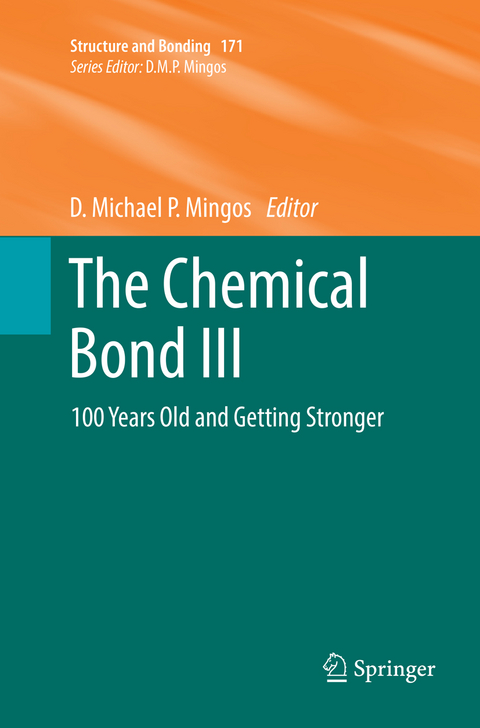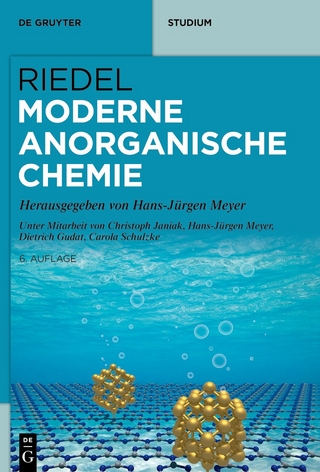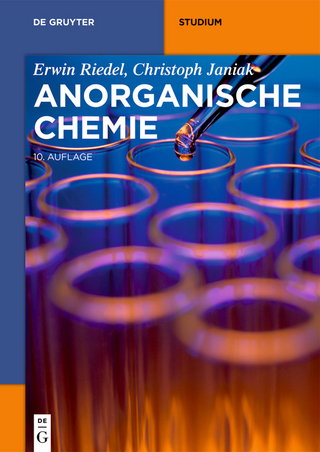
The Chemical Bond III
100 years old and getting stronger
Seiten
2018
|
1. Softcover reprint of the original 1st ed. 2017
Springer International Publishing (Verlag)
978-3-319-81736-1 (ISBN)
Springer International Publishing (Verlag)
978-3-319-81736-1 (ISBN)
The series Structure and Bonding publishes critical reviews on topics of research concerned with chemical structure and bonding. The scope of the series spans the entire Periodic Table and addresses structure and bonding issues associated with all of the elements. It also focuses attention on new and developing areas of modern structural and theoretical chemistry such as nanostructures, molecular electronics, designed molecular solids, surfaces, metal clusters and supramolecular structures. Physical and spectroscopic techniques used to determine, examine and model structures fall within the purview of Structure and Bonding to the extent that the focus is on the scientific results obtained and not on specialist information concerning the techniques themselves. Issues associated with the development of bonding models and generalizations that illuminate the reactivity pathways and rates of chemical processes are also relevant. The individual volumes in the series are thematic. The goal ofeach volume is to give the reader, whether at a university or in industry, a comprehensive overview of an area where new insights are emerging that are of interest to a larger scientific audience. Thus each review within the volume critically surveys one aspect of that topic and places it within the context of the volume as a whole. The most significant developments of the last 5 to 10 years should be presented using selected examples to illustrate the principles discussed. A description of the physical basis of the experimental techniques that have been used to provide the primary data may also be appropriate, if it has not been covered in detail elsewhere. The coverage need not be exhaustive in data, but should rather be conceptual, concentrating on the new principles being developed that will allow the reader, who is not a specialist in the area covered, to understand the data presented. Discussion of possible future research directions in the area is welcomed.
Review articles for the individual volumes are invited by the volume editors
Review articles for the individual volumes are invited by the volume editors
Non-Conventional Lewis Acids and Bases in Frustrated Lewis Pair Chemistry.- Triphosphine Ligands: Coordination Chemistry and Recent Catalytic Applications.- Sigma Bonds as Ligand Donor sites in Transition Metal Complexes.- The Covalent Bond Classification Method and its Application to Compounds that Feature Three-Centre Two-Electron Bonds.- Co-ordination of Lewis acids to transition metals : Z-type ligands.
| Erscheinungsdatum | 05.03.2022 |
|---|---|
| Reihe/Serie | Structure and Bonding |
| Zusatzinfo | VII, 205 p. |
| Verlagsort | Cham |
| Sprache | englisch |
| Maße | 155 x 235 mm |
| Gewicht | 338 g |
| Themenwelt | Naturwissenschaften ► Chemie ► Anorganische Chemie |
| Naturwissenschaften ► Chemie ► Physikalische Chemie | |
| Schlagworte | 2c-2e Bonding Model • ELF Topology • Hypercoordinate Molecules • Kossel Bonding • Lewis Bonding |
| ISBN-10 | 3-319-81736-1 / 3319817361 |
| ISBN-13 | 978-3-319-81736-1 / 9783319817361 |
| Zustand | Neuware |
| Haben Sie eine Frage zum Produkt? |
Mehr entdecken
aus dem Bereich
aus dem Bereich
Buch | Hardcover (2024)
Springer Spektrum (Verlag)
64,99 €


